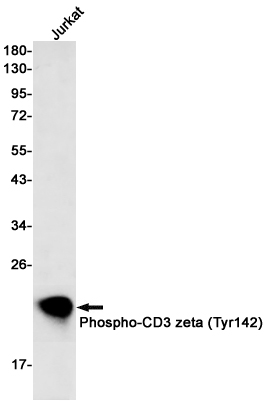-
Product Name
Anti-Phospho-CD3 zeta (Tyr142) Rabbit antibody
- Documents
-
Description
Phospho-CD3 zeta (Tyr142) Rabbit monoclonal antibody
-
Tested applications
WB, ICC/IF, IP
-
Species reactivity
Human
-
Alternative names
T3Z; CD3H; CD3Q; CD3Z; TCRZ; IMD25; CD3-ZETA antibody
-
Isotype
Rabbit IgG
-
Preparation
Antigen: A synthetic phosphopeptide corresponding to residues surrounding Tyr142 of human CD3 zeta
-
Clonality
Monoclonal
-
Formulation
50nM Tris-Glycine(pH 7.4), 0.15M Nacl, 40%Glycerol, 0.01% sodium azide and 0.05% BSA.
-
Storage instructions
Store at 4°C short term. Store at -20°C long term. Avoid freeze / thaw cycle.
-
Applications
WB: 1/1000
ICC/IF: 1/50
IP: 1/20
-
Validations

Western blot detection of Phospho-CD3 zeta (Tyr142) in Jurkat cell lysates using Phospho-CD3 zeta (Tyr142) Rabbit mAb(1:500 diluted).Predicted band size:19kDa.Observed band size:19kDa.
-
Background
Swiss-Prot Acc.P20963.Part of the TCR-CD3 complex present on T-lymphocyte cell surface that plays an essential role in adaptive immune response. When antigen presenting cells (APCs) activate T-cell receptor (TCR), TCR-mediated signals are transmitted across the cell membrane by the CD3 chains CD3D, CD3E, CD3G and CD3Z. All CD3 chains contain immunoreceptor tyrosine-based activation motifs (ITAMs) in their cytoplasmic domain. Upon TCR engagement, these motifs become phosphorylated by Src family protein tyrosine kinases LCK and FYN, resulting in the activation of downstream signaling pathways (PubMed:2470098, PubMed:7509083). CD3Z ITAMs phosphorylation creates multiple docking sites for the protein kinase ZAP70 leading to ZAP70 phosphorylation and its conversion into a catalytically active enzyme (PubMed:7509083). Plays an important role in intrathymic T-cell differentiation. Additionally, participates in the activity-dependent synapse formation of retinal ganglion cells (RGCs) in both the retina and dorsal lateral geniculate nucleus (dLGN) .
Related Products / Services
Please note: All products are "FOR RESEARCH USE ONLY AND ARE NOT INTENDED FOR DIAGNOSTIC OR THERAPEUTIC USE"
